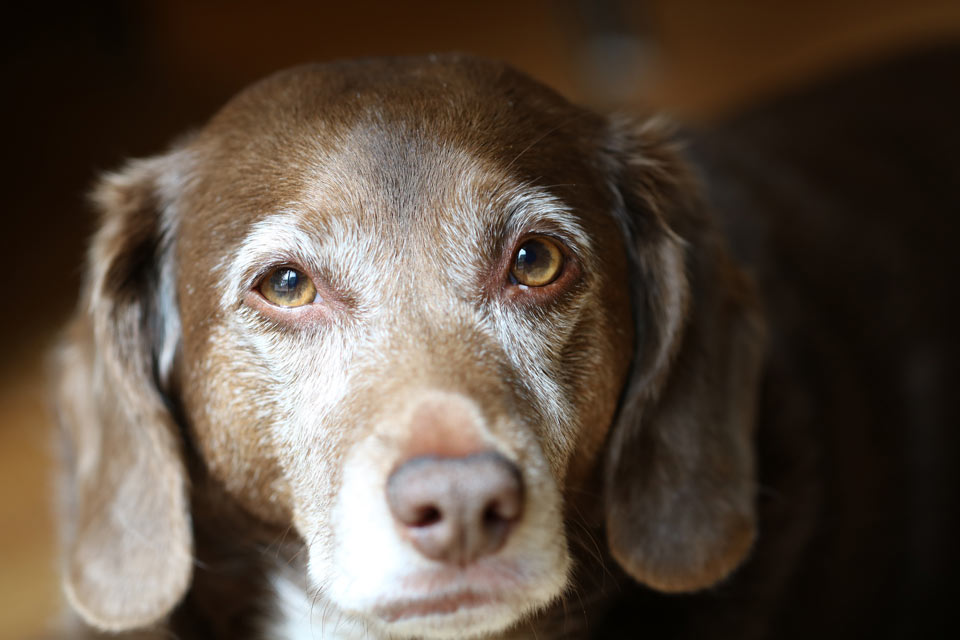Is This Normal Aging or a Problem with My Dog?

Dogs don't speak the way we do, so as pet owners, we need to recognize when something's wrong and get our dog to the veterinarian. And most of the time, people do that very well. However, there are a few things that we commonly dismiss as normal aging that really aren't and should be addressed and treated to improve the dog's quality of life.
Here are a few of the things that are often considered normal canine aging when they can actually be treated or improved.
Difficulty Getting Up and Down
When a dog gets older and starts appearing to have trouble getting up and down, it's common for people to assume that it's a normal age-related process. But limping and difficulty getting rising and lowering from the ground are not normal—they indicate joint, spine, nerve, or muscle problems.
If your dog is acting like she has aches and pains, take her to the vet for an evaluation. A full physical exam can point toward the problem, and the vet may then do some tests to narrow it down from there.
Once the problem is diagnosed, treatment can be instituted. There are many medications, supplements, and diet changes that can decrease inflammation, improve joint health, and increase quality of life for an older dog with limping or stiffness.
Urinary Incontinence
If a dog is dribbling urine as she gets older, it's easy to think it's normal and related to aging. And, while incontinence is more common in middle-aged and older dogs, it often occurs because of an underlying condition that may be treatable.
For example, increased water consumption can aggravate or trigger urinary incontinence. Conditions like diabetes, Addison's disease, and kidney dysfunction can all cause that. If the underlying condition is diagnosed and treated, not only could the incontinence improve, but the dog's overall health and quality of life will get a boost.
Estrogen-related urinary incontinence is common in female dogs, and some medications may help.
Obesity
When dogs get heavier as they get older, many people attribute it to age and less activity. But the truth is that many dogs are overfed, and that catches up as the dog enters middle age and beyond.
But obesity can add to or trigger other conditions like arthritis, heart disease, and diabetes. Obesity shouldn't be considered normal in an older dog. A vet should be consulted with and a dietary plan followed to get the dog back to a healthy weight.
Learn more: "Obesity in Dogs: Overview of Causes and Dangers."
Chronic Ear or Skin Problems
When a dog is prone to chronic ear infections or skin problems, it's common for people to blow it off as simply normal for that dog. But those conditions can be miserable and dramatically decrease quality of life.
If your dog has ear or skin problems, it's essential to consult a vet for diagnosis. Food allergies are a common culprit for chronic skin and ear infections, and even older dogs can benefit significantly from diagnosis and treatment of such issues.
You May Also Like These Articles:
Urinary Incontinence: Causes of Urine Leaking in Dogs
Disclaimer: This website is not intended to replace professional consultation, diagnosis, or treatment by a licensed veterinarian. If you require any veterinary related advice, contact your veterinarian promptly. Information at DogHealth.com is exclusively of a general reference nature. Do not disregard veterinary advice or delay treatment as a result of accessing information at this site. Just Answer is an external service not affiliated with DogHealth.com.
Notice: Ask-a-Vet is an affiliated service for those who wish to speak with a veterinary professional about their pet's specific condition. Initially, a bot will ask questions to determine the general nature of your concern. Then, you will be transferred to a human. There is a charge for the service if you choose to connect to a veterinarian. Ask-a-Vet is not manned by the staff or owners of DogHealth.com, and the advice given should not delay or replace a visit to your veterinarian.



